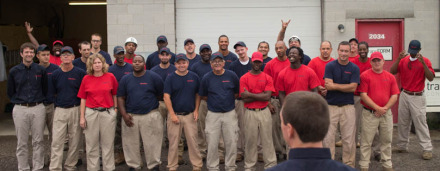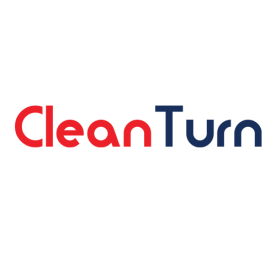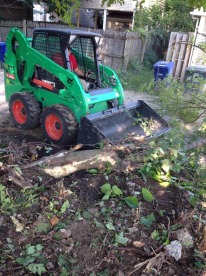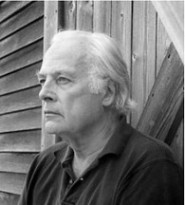Profit, Compassion and Grit
For Alfonso Byrd, prison was a turning point for the better. “After that experience I decided I really needed a change in life because, you know, prison wasn’t my thing.” Yet, despite his change of heart he found that the felony conviction now attached to his name made it difficult for him to land a decent job after leaving prison.
“I worked a few airport jobs . . . I took elderly people to their dialysis appointments. I bounced around from temp service to temp service [fearing] that the felony on my record would hold me back.”
Founded in 2012, CleanTurn provides grounds-keeping, interior demolition, janitorial, and general labor services to local businesses and organizations in Columbus, Ohio. While fulfilling market demand, CleanTurn also provides market-wage employment opportunities to individuals who have high obstacles to employment, including prior incarceration.
“We’ve provided a little over 200 employment opportunities,” CleanTurn CEO John Rush explains. “About 50% of those participants have used us as a stepping stone to move on to other opportunities. We currently have 44 on payroll. Everyone else either it wasn’t a good fit, a poor attitude or relapse.”
In Byrd’s case, CleanTurn was a good fit and a godsend. “My life has changed tremendously honestly,” he says. “Being part of an organization where nobody judges you and everybody accepts you based on your character, integrity and your work ethic was great and it gave me confidence to forge ahead despite the past.”
Byrd is now the property services manager at CleanTurn.
From K-Town to Columbus
After serving both as a Sergeant in the Marine Corps and as a pastor, CleanTurn’s founder John Rush cut his teeth as a social entrepreneur by volunteering at a homeless shelter in Chicago. Rush’s growing need to understand the community he was serving led him to the alleyways of K-Town, a neighborhood on Chicago’s west side.
Having grown up in a trailer park in Winfield, West Virginia, Rush wasn’t a stranger to poverty. “But I didn’t know what West-Side-of-Chicago poverty was,” he explains. “I knew unless I had authentic, genuine relationships with individuals on the west side I couldn’t ask the right questions or at least begin to learn to ask some of the right questions.”
By sleeping in K-Town’s backstreets and rubbing shoulders with neighborhood gang members, Rush learned about the enormous challenges individuals face as they make the transition from prison into community life. Individuals with felony convictions aren’t considered for most jobs and are ineligible for student loans as well as military enlistment. “They may even have trouble getting a driver’s license or face a possible ban from public housing,” Rush says. “Most have never had a dad or a strong family so they really don’t have a lot of mentoring, coaching or role modeling.”
Starting in 2005, Rush put these insights to work as the managing director of Cleanslate, a neighborhood beautification business, and later as president of 180 Properties, a property rehabilitation and maintenance firm. Both enterprises provide job opportunities to ex-offenders while serving the market.
While on a short hiatus from work in 2011, Rush was approached by an investor with an opportunity to start a business for ex-prisoners in Columbus, Ohio. Unlike Cleanslate and 180 Properties, which were both owned by nonprofits, the start-up would be privately owned and would be geared to produce more permanent job opportunities. Moreover, the profit paid out to CleanTurn’s investors would either be cycled back into the business or donated to charities.
“We really did think we could leverage the market for the services we were providing to affect society in a positive way without using public funding or philanthropic dollars over the long haul to do so,” Rush explains.
The Model and the Mission
The firm’s ownership structure frees CleanTurn from certain constraints that Rush experienced in his prior role operating a business owned by a non-profit.
“We thought the capital would be a little easier to get ahold of, and we thought the restrictions on that capital would be significantly less because it’s our capital. So we maintained that control; whereas, in a non-profit you’re bound to certain obligations that can sometimes be synergistic with your mission but sometimes can be a stretch.”
For instance, Rush explained that dilemmas would arise in the non-profit operations, such as when a certain number of employees were needed to fulfill a contractual obligation but those same employees might also have mock interviews or other job training classes arranged by the owning non-profit at the same time.
“At Cleanslate, we created solutions over time to address those challenges, but it was extremely complicated,” Rush says. “Because of its complexity, the ability to scale, replicate or grow was nearly impossible.”
Still, there were benefits to being owned by a non-profit. “Having been in this now for a little over two and a half years, one of the things that I know I undervalued and that I miss dearly is that the non-profit owner of Cleanslate provided seven weeks of soft skills training, so we had individuals who went through a very rigorous training prior to coming to Cleanslate.”
Because CleanTurn sources its employees from multiple local non-profits, employees arrive at CleanTurn with a mixed bag of training. As a result, Rush has had to adapt his training model. Whether it’s regarding customer service, personal finances or transportation, CleanTurn’s culture of accountability pushes Rush and his staff to create solutions when problems arise instead of relying on handouts.
“It’s all self-driven. So that is a little unique,” Rush explains. “Our model pushes many of those life decisions down to the individual. It’s really an empowering thing to have to make those choices. And [we] coach one another and give ideas and suggestions along the way.”
Rush offers an example:
A fellow had been late a couple of times to a job site because he’s wasn’t able to figure out a way to get himself to and from work. At Cleanslate, I would have referred that individual to the parent non-profit so they could help figure out a transportation solution. At CleanTurn, I challenged this gentleman to think about options on his own. I explained to him that we provide you an opportunity to provide for yourself vis-à-vis employment, to get on your feet and move forward. What you need to do is figure out a way to get to work. But what I can tell you is that you have the capacity to create solutions.
Balancing compassion and grit is not without its challenges, though. “It’s hard to discipline your organizational structure to only address the needs that you have the capacity to address . . . There are days I’ll just sit in my office and cry because there’s nothing else [we] can do as an organization,” Rush says. “But we’ve had to learn that discipline of staying focused and leaning on community partners for things like housing, or mental health, or substance abuse. We know where we can refer individuals that can provide additional support and services, so we’re one player among many to a difficult and complicated issue—We provide a place of employment where there’s intensive coaching.”
The model seems to be working. CleanTurn has grown into a $1.5 million operation and was profitable even after its second year in business.
“An Opportunity to Blossom”
At the heart of CleanTurn is a deep appreciation for the inherent worth of each individual. “The people we work with, there’s such a lack of self-confidence, a lack of recognizing the innate beauty of what it means to be a human being,” says Rush.
The diminished sense of self-worth that many ex-offenders experience is why CleanTurn’s programming involves intensive on-the-job coaching.
“I remember last year John and I had a great coaching moment,” Byrd recalls. “I was working hard and was frustrated that I wasn’t doing well enough. I told John that I was doing everything I could for him. And he stopped me, and he told me not to do it for him, but to do it for myself and my family.”
Engendering a heightened sense of personal responsibility by encouraging better decision making may be one of the most difficult aspects of the work, but it is also one of the most crucial for long-term transformation. According to the National Institute of Justice , “although offender services and programs may have a direct effect on desistance, individuals must decide independently to transform themselves into ex-offenders.”
As Rush explains, the work is tough: “Sometimes breaking through the psychological hurdle can be extremely challenging. But we try to work through that hurdle to get individuals to the point where they’re legitimately and in a healthy way cut off from subsidies. I tell them, ‘You know, let’s work through this. There might be a slight decrease in your benefits, but let’s talk about how to budget your money so you can begin to move closer and closer to self-sufficiency.’”

CleanTurn CEO John Rush addresses his team.
Like Byrd, Angela Wilson, CleanTurn’s janitorial supervisor, has benefitted from the encouragement, opportunity and coaching provided by the business.
“CleanTurn gives you an opportunityto blossom. I am an ex-addict and life wasn’t so great out there, you know?” she explains. “I was homeless and didn’t care about myself. Now I’m more productive and I come to work to be the best that I can be. . . I’m actually trying to get myself out of debt so I can go and own my home and maybe go back to college after I get my stuff paid off.”
As CleanTurn heads into its third year in business, the firm is working to build their capacity with the hope of eventually scaling the business, and in turn, provide more opportunities for individuals who have had significant obstacles to employment an opportunity to blossom.







